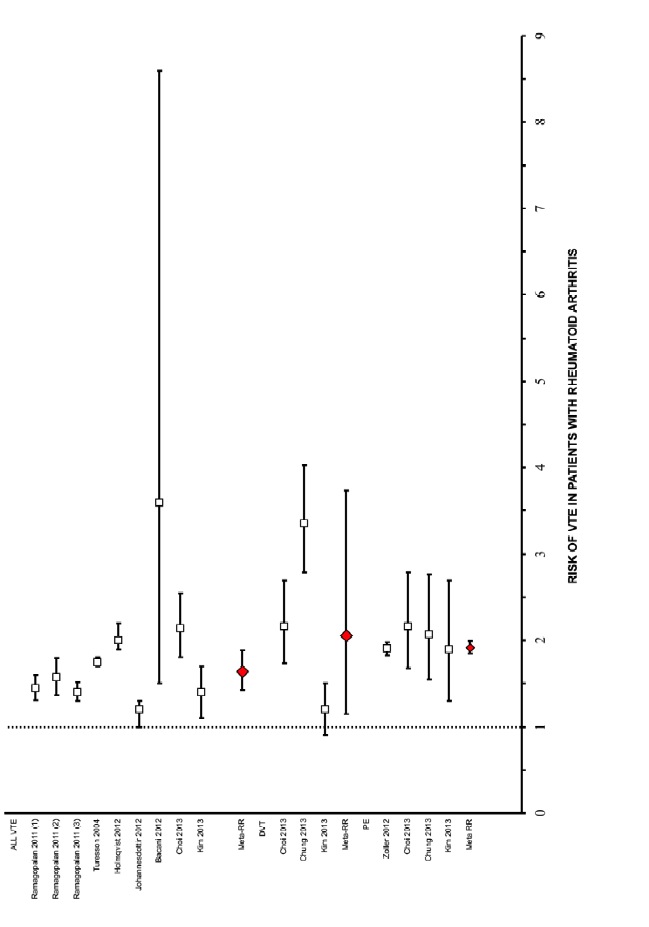Session Information
Title: Rheumatoid Arthritis - Clinical Aspects (ACR): Comorbidities, Treatment Outcomes and Mortality
Session Type: Abstract Submissions (ACR)
Background/Purpose: Venous thromboembolism (VTE), which includes both deep vein thrombosis (DVT) and pulmonary embolism (PE), is the third most common vascular event after myocardial infarction and stroke. Several studies have investigated the risk of VTE among patients with rheumatoid arthritis (RA), a chronic and disabling disease associated with systemic inflammation. Our objective was to perform a meta-analysis of studies evaluating the risk of DVT and PE in patients with RA.
Methods: We systematically searched MEDLINE (1946–2013) and EMBASE (1974–2013) databases for studies that reported the risk of VTE in patients with RA. Our search strategy employed Medical Subject Headings (MeSH terms) together with keywords for unindexed concepts relating to the themes of RA and VTE. Eligibility criteria were: 1) original data from cohort or case-control studies; 2) pre-specified RA; 3) clearly defined VTE outcomes; 4) relative risk (RR), odds ratio (OR), or hazard ratio (HR), and corresponding 95% confidence intervals (CI); 5) sex- and age-matched comparison group; and 6) English language. We calculated weight-pooled summary estimates of RRs for VTE outcomes using the random effects model. The robustness of the results was evaluated using a jack-knife sensitivity analysis (i.e., removal of a single study from the baseline group of studies). All analyses were done using HePIMA software.
Results: Our search strategy yielded 86 articles, and we identified an additional 2 citations through a hand-search of relevant bibliographies. After applying the eligibility criteria, we identified 8 studies with a total of 479,452 RA patients for inclusion in the meta-analysis. We identified 7 cohort studies (of which one reported results for three separate cohorts) and 1 case-control study. Overall, pooled estimates for VTE, DVT and PE were significantly increased (Table 1 and Figure 1). The estimates remained statistically significant in the jack-knife sensitivity analysis with the point estimates ranging from 1.58 to 1.72 and the corresponding 95% CIs >1 in all cases except for DVT.
Conclusion: The risk of new VTE events is increased in RA patients compared to age- and sex-matched controls. However, there exist a paucity of data on the risk of PE and DVT. These findings support increased vigilance of VTE complications and potential risk-factor intervention among RA patients.
|
Table 1. Pooled estimates on the risk of VTE events in Rheumatoid Arthritis |
||
|
Events |
No. of Studies |
Pooled RR (95% CI) |
|
VTE |
8 |
1.64 (1.42, 1.89) |
|
DVT |
3 |
2.06 (1.14, 3.74) |
|
PE |
4 |
1.92 (1.85, 1.99) |
Disclosure:
M. Avina,
None;
S. Choi,
None;
S. Rai,
None;
H. K. Choi,
None;
M. De Vera,
None.
« Back to 2014 ACR/ARHP Annual Meeting
ACR Meeting Abstracts - https://acrabstracts.org/abstract/risk-of-venous-thromboembolic-events-in-patients-with-rheumatoid-arthritis-a-meta-analysis-of-observational-studies/

